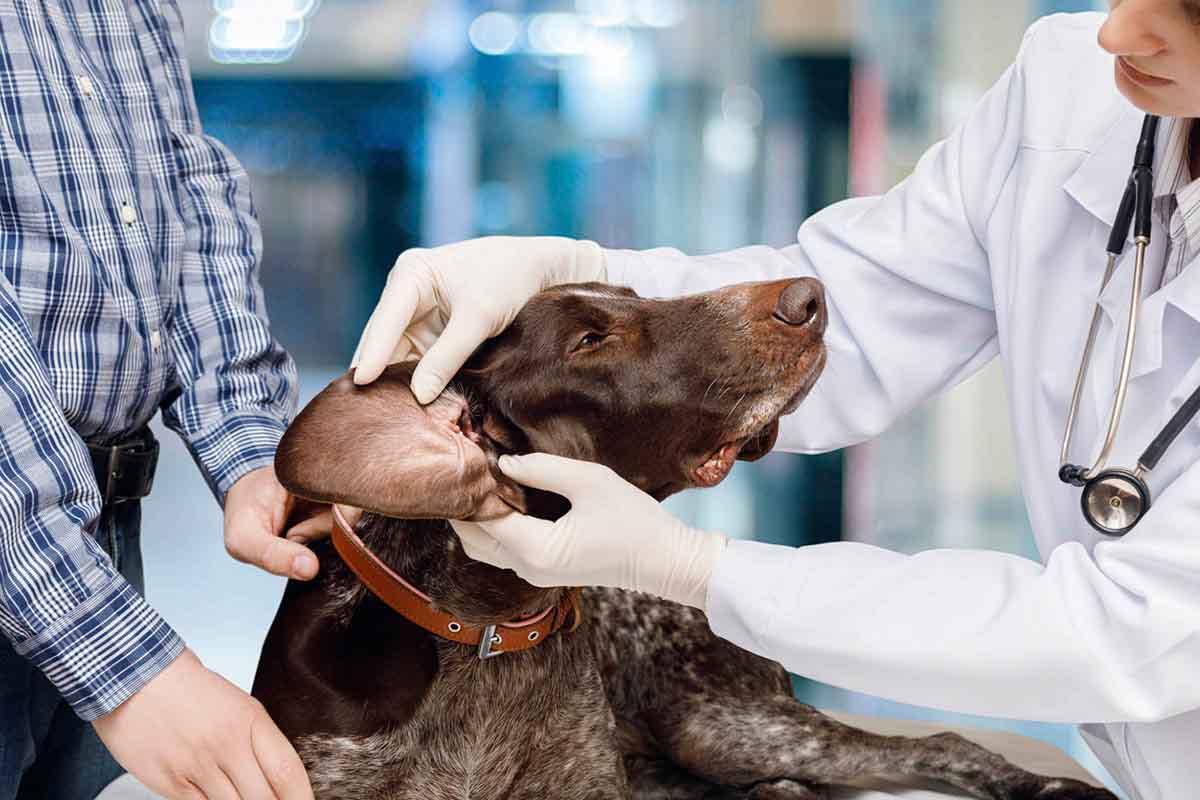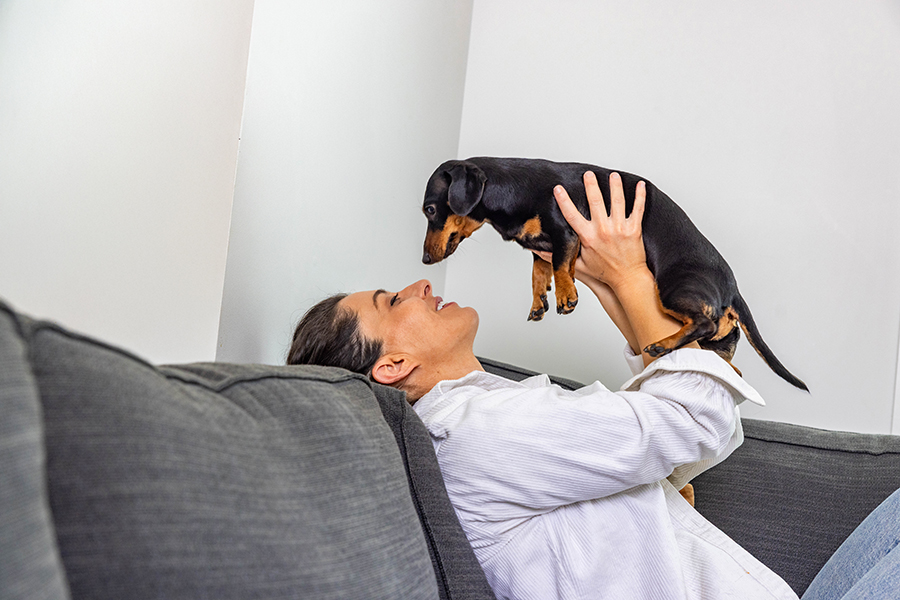Why Does My Dog Keep Getting Ear Infections?
Wondering why your dog keeps getting ear infections? Take a closer look at its diet.
Nothing is worse for loving pet parents than seeing their best friend suffering from some kind of health challenge. A common problem that many dogs, particularly those with floppy ears, suffer from is that of ear infections.
If you have a pooch that has problems with chronic ear infections, you know the symptoms all too well. Head shaking, head tilt, and scratching at his ears, sometimes until he bleeds, are all common signs of an ear infection.
Though you give him regular ear cleanings, he continues to have problems. So, what can you do? Read on to learn more about why your dog keeps getting ear infections and what you can do to stop the problem.
What Causes a Dog’s Ear Infection?

Most ear infections in dogs are outer ear infections that only affect the outer part of the ear canal and ear flap, known as the pinna. The medical term for this condition is otitis externa (aka “external ear”).
Your pet can, however, also develop a problem in his middle ear, a condition known as otitis media. An inner ear infection is referred to as otitis interna, and that is a more serious problem that can result in permanent hearing loss. But what causes the problem?
There are a number of different underlying causes of ear infections in dogs. Let’s take a look at some of the more common underlying conditions that cause problems for your dog’s ear canal.
Foreign Bodies
One reason your pet might develop an ear infection is the presence of foreign objects in the ear canal. This might be something like a foxtail, a grass seed, that gets in his ears while he’s playing outside, or it could even be something like an insect.
Water in the Ears
Along the lines of a foreign body, your dog might also get water buildup in his ears, and that can cause chronic ear infections. The moisture in the ear canal leads to bacterial growth, and that can become a chronic problem. This is why it’s important to thoroughly dry your pet’s ears after he’s been for a swim.
Polyps in the Ear Canal
A polyp or other type of tumor in the ear canal can trap debris and moisture that enters the ear and cause inflammation that leads to a chronic ear infection. Polyps are the most common type of mass, as are adenomas. Both can lead to a bad odor as well as bloody or waxy discharge from your dog’s ear.
Bacterial and Yeast Infection
Bacteria and yeast are normal environmental contaminants that occur naturally in your pet’s ears and on his skin. The problem occurs when there is an overgrowth that leads to infection.
What’s worse, a fungal or yeast infection can co-occur with a bacterial infection, which makes for a very uncomfortable pup. It’s also possible that the infection could affect one or both of your pet’s ears.
Ear Mites
Ear mites are another common cause of ear infections, particularly in cats. While dogs don’t get ear mite infections as much, they can, particularly if they are sharing a home with an infected cat.
Ear mites are ectoparasites, meaning external parasites, that are found commonly in the environment. In fact, they are the second most common external parasite found on pets; the most common is the flea. They cause violent head shaking and can result in an aural hematoma, which is a rupture of blood vessels in the ear flap that causes a blood blister or pocket of trapped blood. A common sign of an ear mite infection is dark, crumbly material in the ears.
Food Allergies and Other Environmental Allergies

Environmental and food allergies can cause your dog’s skin to become inflamed, and that can trigger an ear infection once the skin in the ear canal gets irritated. When it becomes inflamed, it creates the perfect environment for bacteria and yeast to grow. If your pet is constantly getting ear infections, that’s a sign of possible food sensitivities.
Endocrine Problems
Another relatively common cause of chronic ear infections is an endocrine disorder of some kind. These are disorders that affect your pet’s hormone production and metabolism. Examples include diabetes and hypothyroidism.
Such disorders can also cause changes in the skin that make it more fragile and sensitive. This causes the sensitive skin in the ear canal to be more susceptible to inflammation and subsequent infection.
Breed Predisposition
Certain breeds of dogs are more susceptible to ear infections as well. These include dogs with floppy ears, like certain hounds, and dogs with large amounts of hair in their ears, which can trap more debris and moisture. Poodles, Cocker Spaniels, Labrador Retrievers, Golden Retrievers, Beagles, and Basset Hounds are among the breeds more commonly affected by ear infections.
What are the Symptoms of Ear Infection?

There are a number of signs that your pooch has an ear infection. Here are some of the more common ones:
- Painful ear
- Head shaking
- Brown or black material in the outer ear flap
- Head tilt
- Constant pawing at the ear
- Narrowed ear canal, known as stenosis
- Waxy or bloody discharge
- Bad odor coming from the ear
- Hearing loss in more severe cases
- Loss of balance
- Crusty areas of thickened skin around the ear
How are Ear Infections Treated?
While it may be tempting to use cotton balls or cotton swabs to clean out your pet’s ear canal, this can cause even more problems. It’s a good idea to take your buddy to the veterinarian to determine the underlying condition causing the problem.
Your DVM will use an otoscope to examine your pet’s ear canal, and that will allow them to visualize anything that might be in your dog’s ear, like a foreign body, wax plug, or parasite. If there’s something there, they can remove it.
If there is not any visible cause for the infection, your veterinarian will likely conduct a microscopic examination in addition to the otoscopic exam. They will look for some type of infection, and there may be more than one, and if they find that, they will likely prescribe ear drops for your pup’s condition. They will also give your dog’s ears a thorough flushing and cleaning.
If there is no clear cause of your dog’s recurrent or severe ear infections, your veterinarian may opt to conduct other tests to look for underlying diseases, like endocrine disorders, or underlying conditions, like food allergies.
Allergies are a big part of ear infections. They occur in 43% of cases, and ear infections, specifically, occur in 65 – 80% of dogs that have food allergies. If your dog does have a food allergy, your vet may recommend a special diet to break the cycle. Often, this means feeding your dog a different kind of protein that he has never eaten before. His immune system won’t react to the new protein, and that can reduce the symptoms.
If your dog has an endocrine disorder, that will likely require other types of medications to correct the problem. Which type of medication they may use will depend on the nature of the endocrine disorder.
What About Ear Canal Surgery?
If your pet’s chronic ear infections have become so bad that they have effectively closed off the ear canal, your vet will likely try anti-inflammatory medications to shrink the swollen tissues. If that doesn’t work, however, they will likely recommend surgery.
Ear canal surgery can involve what is known as a lateral ear resection to remove the vertical part of the ear canal, and, in doing so, remove the swollen tissue. However, in some cases, it is necessary to actually remove the entire ear canal. This is known as a total ear canal ablation and bulla osteotomy (TECA-BO), and that can result in permanent hearing loss.
What About Home Remedies?
As with any medical condition, the internet has numerous home and natural remedies that people claim work for their pet’s ear infections. The reality is that they don’t usually work, and they can make the problem worse.
Because ear infections can be caused by numerous underlying conditions, you need to take your buddy to the vet to determine the appropriate treatment. Moreover, you should never put anything in your dog’s ear unless instructed to do so by your veterinarian. You could easily rupture your pet’s ear drum, and if that has already happened because of the infection, putting something in your pet’s ear could cause extreme pain as well as more damage.
You’ll find suggestions on the internet for using things like vinegar, hydrogen peroxide, or rubbing alcohol to clean out your pet’s ears. While the acid in vinegar may kill yeast, it is mostly water, which creates more moisture and encourages bacterial growth. Hydrogen peroxide is also mostly water, and your pet will likely hate the bubbling in his ear.
Finally, rubbing alcohol will cause your pet to experience unbearable pain. That will be awful for you to watch, and it will make your dog unwilling to let anyone near his ears ever again. Finally, if the underlying cause of your dog’s ear infections is something like a food allergy or an endocrine condition, these home remedies will do nothing to stop the problem.
This content is for informational use only and does not replace professional nutrition and/or medical advice, diagnosis, or treatment. It is not a substitute for and should not be relied upon for specific nutrition and/or medical recommendations. Please follow your veterinarian’s instructions and talk with to them about any questions or concerns.







